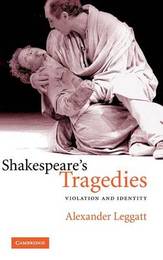
|
Shakespeare's Tragedies: Violation and Identity
Hardback
Main Details
| Title |
Shakespeare's Tragedies: Violation and Identity
|
| Authors and Contributors |
By (author) Alexander Leggatt
|
| Physical Properties |
| Format:Hardback | | Pages:240 | | Dimensions(mm): Height 229,Width 152 |
|
| ISBN/Barcode |
9780521846240
|
| Classifications | Dewey:822.33 |
|---|
| Audience | | Professional & Vocational | |
|---|
|
Publishing Details |
| Publisher |
Cambridge University Press
|
| Imprint |
Cambridge University Press
|
| Publication Date |
12 May 2005 |
| Publication Country |
United Kingdom
|
Description
Shakespeare's Tragedies: Violation and Identity traces the linked themes of violation and identity through seven Shakespearean tragedies, beginning with the rape of Lavinia in Titus Andronicus. The implications of this event - its physical and moral shock, the way it puts Lavinia's identity, and the whole notion of identity, into crisis - reverberate through Shakespeare's later tragedies. Through close, theatrically informed readings of Titus Andronicus, Romeo and Juliet, Hamlet, Troilus and Cressida, Othello, King Lear and Macbeth the book traces the way acts of violence provoke questions about the identities of the victims, the perpetrators, and the acts themselves. It shows that violation can be involved in the most innocent-looking acts, that words can be weapons, that interpretation itself can be a form of damage. Written in a clear, accessible style, this study provokes questions about the human implications of Shakespearean tragedy.
Author Biography
Alexander Leggatt is Professor of English at University College, University of Toronto.
Reviews'Leggatt proves himself a remarkably sensitive and subtle guide, providing engaging, even surprising comments which provoke the reader to think more carefully about Shakespeare's plays. ... this is a fine book of straightforward criticism. For its clarity alone, it is invaluable to anyone interested in Shakespeare: undergraduates will find it endlessly informative (and what's more, they'll understand it), while established scholars will also discover significant gems.' New Theatre Quarterly 'A deeply imaginative book ... By the time we come to the end of the book we realize how inexhaustibly fruitful his cumulative method is.' Shakespeare Survey 59
|